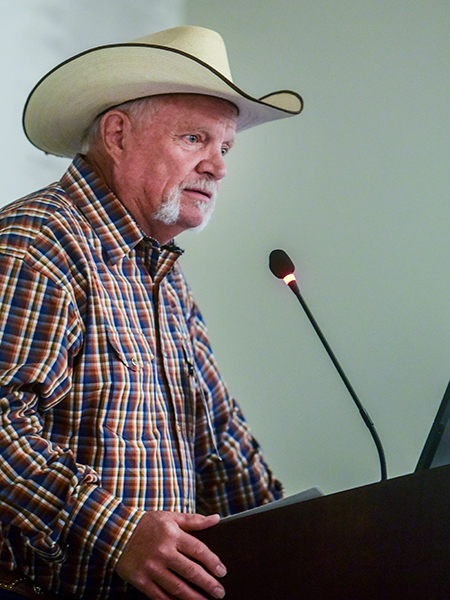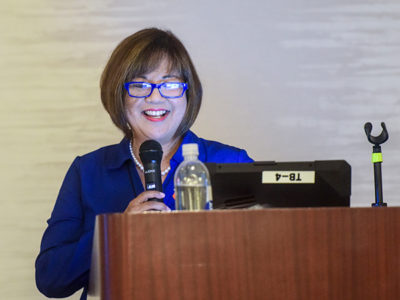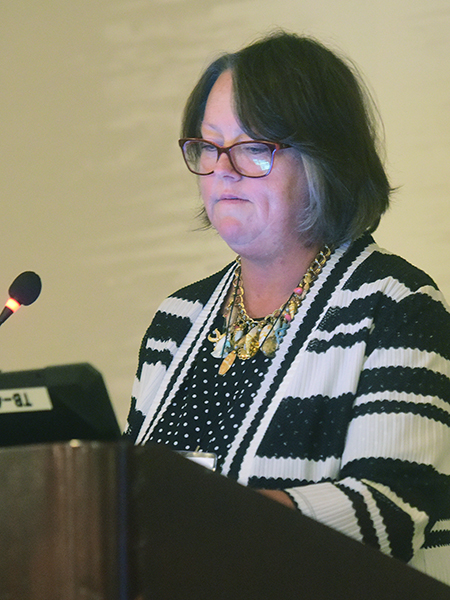
A small army of advocates was celebrated for the work they do in child passenger safety at the 3rd annual Texas Child Passenger Safety Conference, held in Austin July 29–31. Most of the 270 attendees were child passenger safety seat technicians (CPSTs) from across Texas. As part of the conference, they learned how tragedies can sometimes lead people to become inspirational activists for change.
Conducted by the Texas A&M Transportation Institute (TTI) and Texas A&M AgriLife Extension, the conference helps CPSTs keep abreast of all the new child seat technologies and allows them to receive their continuing education credits towards recertification as a CPST.
Featured Speaker Terry Smith, who was a trooper for the Utah Highway Patrol in 1995, became the first CPST in his state after investigating the death of a two-year-old girl named Allison, who died in a crash in which her booster seat was too large for her size.
“Allison died while I was trying to save her,” Smith told the audience. “Her death had a profound impact on me. I made a promise to her parents, and it became my mission to make sure other kids were safe. My story is not about me, it’s all about Allison,” Smith said, still visibly shaken from the 24-year-old crash that changed his life. Since becoming a CPST, Smith says he’s personally checked more than 1,300 car seats and has taught numerous others to become CPSTs. He’s sure that lives have been changed and saved as a result.

The year before the Utah crash, a crash near Snyder, Texas, changed the life of Karen Slay, who was instrumental in the passage of the “Kid’s Aren’t Cargo” legislation that prohibits anyone younger than 18 from riding in the bed of a pickup truck. The law went into effect in 2001. The crash that prompted her advocacy involved eight children who died after being thrown from the pickup’s bed following a collision with an 18 wheeler. In the years following the crash, Slay not only raised the national awareness of the dangers associated with kids riding in pickup beds, she also became a CPST and an instructor.
Karen Slay’s life was celebrated at the opening session of the conference. “It’s not too much of a stretch to say that every child in Texas is a little safer today because of the efforts of Karen Slay,” said Karen Peoples, a Texas Department of Transportation behavioral traffic safety specialist in Lubbock and Slay’s friend. Slay died earlier this year after a battle with cancer. “Her legacy lives on in the countless lives she saved during her time in child passenger safety, but also in the connections she made with other individuals that work in this very important field,” Peoples said.

In 2018, there were 62 Texas traffic crash fatalities that involved children under the age of eight. “Sixteen of those children were unrestrained at the time of the crash,” Carol Campa of TxDOT’s Traffic Safety Division told attendees. “We can all agree that this is completely unacceptable.”
Campa applauded the CPSTs, reminding them that their work helps children go home safe after a safety seat checkup. “We must constantly remind ourselves of the importance of what we do and celebrate the progress we have made, while knowing there is so much more left to do. It’s going to take us all working together to keep our children riding safely on our roadways.”
Among the numerous conference sessions, attendees learned how children’s bodies react in crashes involving front- and rear-facing seats, research on car seat installation techniques, how to develop a coalition approach to child safety advocacy, and how automated vehicle technologies could positively impact child safety.
“But even with all the future technologies and all the changes that are going to happen in the coming years, I want you to please remember that nothing can replace you,” said Maggi Gunnels, the Region 6 administrator for the National Highway Traffic Safety Administration. “You are part of this community, you do the work, you are passionate, and you volunteer. Technology is great, but it’s not going to happen without you.”
TTI Senior Research Scientist Katie Womack, project director for the conference, said, “It’s gratifying to know that these technicians will be going back to their communities with renewed energy and knowledge to help keep children riding safely.”